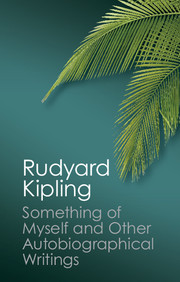“MY FIRST BOOK” (1892)
Summary
(The Idler [London], 2 [December 1892], 475–82;
collected in Sussex Edition, xxx
[London, Macmillan, 1938])Editor's Note
“My First Book” was written for a series of articles published in The Idler, a new magazine edited by Jerome K.Jerome and by Kipling's friend, the Canadian journalist Robert Barr. Other authors contributing to the series included Walter Besant, Hall Caine, Conan Doyle, Rider Haggard, Bret Harte, and Robert Louis Stevenson. Their articles were all collected and published in book form, with an introduction by Jerome, in 1894.
When Kipling's contribution to the series was published in The Idler it was prefaced by the poem now called “In the Neolithic Age” but then entitled “Primum Tempus.” The poem has not since been included in any reprinting of “My First Book,” but I include it here as Kipling's implicit comment on his first book.
The book that Kipling identifies as his “first” (curiously enough, he never names it in the article) is Departmental Ditties and Other Verses (Lahore, 1886). It was not, strictly speaking, his first: that would be Schoolboy Lyrics, printed by his parents without Kipling's knowledge, in Lahore, 1881; his second book, Echoes (Lahore, 1884), was a collection of parodies in collaboration with his sister; his third, Quartette (Lahore, 1885), was the work of all four Kiplings, father, mother, sister, brother. Departmental Ditties is thus the fourth of Kipling's books, but the first to be both wholly his own and published on his own initiative.
- Type
- Chapter
- Information
- Something of Myself and Other Autobiographical Writings , pp. 171 - 178Publisher: Cambridge University PressPrint publication year: 2013



